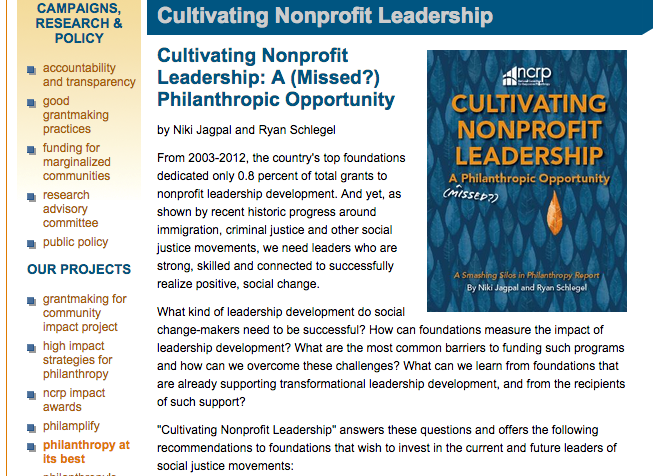
Announcing the Cultivating Nonprofit Leadership Report from NCRP
As an NCRP member, TWI is pleased to repost this announcement of the Cultivating Nonprofit Leadership: A (Missed?) Philanthropic Opportunity Report. We are also pleased to see some of our grantees prominently featured in the report:
Social justice work cannot happen without the leadership of strong, skilled and connected individuals passionate about the work they do. Like many of you, I’ve benefited from a number of excellent programs throughout my career. One thing is crystal clear: leadership development is a vital aspect of any effort to address long-standing structural barriers to sustainable, positive change. If we look at recent victories in a number of different issues, it’s undeniable that leadership has played a key role in mobilizing these movements.
Today, I am excited to release Cultivating Nonprofit Leadership: A (Missed?) Philanthropic Opportunity, part two of the “Smashing Silos in Philanthropy” series. The report, written by my colleagues Niki Jagpal, our senior director of research and policy, and Ryan Schlegel, our research and policy associate, addresses the philanthropic sector’s chronic underinvestment in leadership development. Data over the past 10 years show that less than 1 percent of total grant dollars went toward supporting the holistic growth and well-being of current and future grassroots leaders.
Cultivating Nonprofit Leadership makes a compelling case for foundations to expand the support for leadership development, providing concrete examples of leadership investments that have made a difference, not just for individuals, but for the issues they work on.”
-James E. Canales, president of the Barr Foundation
READ “Cultivating Nonprofit Leadership”
The authors assess the current state of leadership development in the sector, profiling leaders and analyzing leadership development programs that have led to both qualitative and quantitative gains within social justice movements. It also identifies three ways that funding for this strategy directly leads to real results in philanthropy. Not only does focused leadership development disrupt usual thinking, generating new ideas and relationships that can build networks, but it also prevents burnout for top executives and has a multiplier effect on organizations, with its benefits accruing to secondary and tertiary leaders, too.
Finally, the report offers five recommendations for how grantmakers can increase support for leadership development, from increasing funding to using a culturally inclusive lens.
With the tricky issues our nation faces, the need for leadership development is urgent, and there’s a lot at stake. We encourage you to read this report, share with your colleagues and most importantly, tell us what you think: Why is leadership development important to you and your organization?
Aaron Dorfman is executive director of the National Committee for Responsive Philanthropy (NCRP). Follow @NCRP on Twitter.
The post Cultivating Nonprofit Leadership: Read NCRP’s New Report Analyzing this (Missed?) Philanthropic Opportunity also appears on blog.ncrp.org.